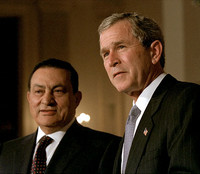It's no secret that the U.S.-Egyptian relationship is ailing. As his term went on, President George W. Bush seemed to go to Egypt principally to deliver stern lectures. After years of visiting Washington every spring, Egyptian President Hosni Mubarak stopped coming to Washington at all. Despite -- or perhaps because of -- $2 billion per year changing hands, the mutual resentment has become palpable. The hostility among the two leaders reflects a deeper divide between their governments and even among peoples. More than three decades after U.S. and Egyptian presidents together changed the landscape of the Arab-Israeli conflict, the U.S.-Egyptian relationship has grown stale. Egyptians feel unappreciated, and they complain that they have sold off their foreign policy for meager reward. Americans feel that their aid has been taken for granted, and they are embarrassed that so close an ally has such a checkered record in treating its own people. Although the two sides continue to cooperate on a wide array of shared interests, the amount that is done out of goodwill continues to dwindle. The relationship has been drifting downward for years, and it can drift downward still. Yet the way in which the relationship continues to disappoint expectations is corrosive. It makes even things that Americans and Egyptians agree upon harder to accomplish, and that exacerbates differences. Both countries have an interest in redefining the relationship, in one of two ways.
U.S.-Egypt: The Magic is Gone

